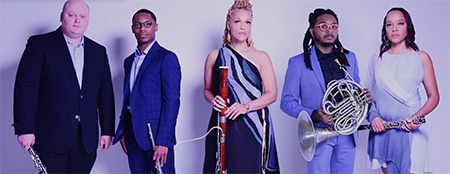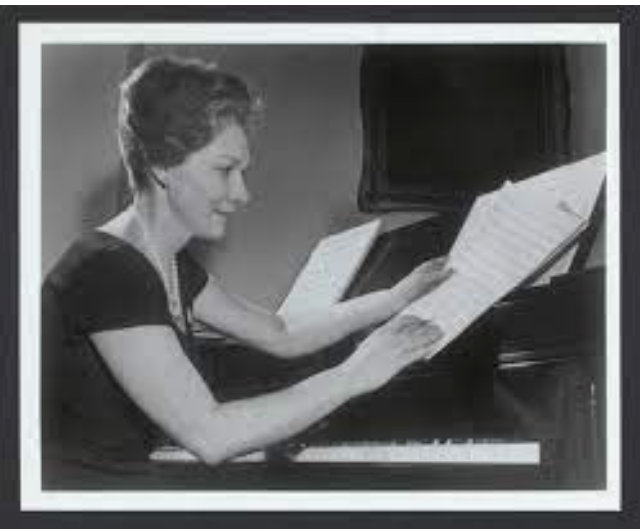by Jarrett Hoffman

Cleveland Chamber Music Society will present a full season of eight live, in-person concerts in 2021-2022. The Imani Winds (pictured) will open the Tuesday evening series on October 5, followed by cellist Edgar Moreau and pianist Jérémie Moreau on October 26, the Cavani Quartet on December 7 (an episode in its “Beyond Beethoven” cycle), the Danish String Quartet on January 25, Cuarteto Casals on February 22, the Rosamunde String Quartet on March 15, tenor Lawrence Brownlee on April 26, and the Takács Quartet with cellist David Requiro on May 3. Performances will take place at Plymouth Church in Shaker Heights with the exception of October 5 (Kulas Hall at CIM), and October 26 and April 26 (Maltz Performing Arts Center at Case).
Summit Choral Society’s 32nd season, titled “Forward,” reflects its return to live performances, although the organization notes that it is “proud to have provided in-person singing throughout the COVID19 pandemic with no instances of transmission.” Summit’s programs include the Metropolitan Chorus, which will give three concerts during the year in Akron’s St. Bernard Church and Greystone Hall, community sing sessions with the Akron City Gospel Singers, its extensive Children’s Choir Program, “Drumming,” a hybrid experience for high schoolers and young adults, the early childhood program “Sing With Me” for children up to 5 years of age and their caregivers, and its one-week Summer Music Camps for children of school age. Read a press release here.
TODAY’S ALMANAC:

Peggy Stuart Coolidge, born on this date in 1913 in Swampscott, Massachusetts, is known for her distinctly American compositional voice influenced by popular and folk music.
Despite that, she’s better known abroad. Significant performances overseas during her lifetime included a 1967 concert of American music in Tokyo (she was also received by the Crown Prince of Japan) and, in 1970, a program presented in the Soviet Union that was devoted entirely to her music — a first for any American composer.
Coolidge studied with Quincy Porter at New England Conservatory, and Boston became an important musical hub for her. She had an especially strong relationship with The Boston Pops Orchestra, which premiered three of her orchestral works. Other Beantown activities included playing piano for hospitalized troops during World War II, serving as pianist and assistant conductor of the Women’s Symphony of Boston, and founding the Junior League Orchestra. (Plus, her scores are now held at the Harvard Library.)
Coolidge’s sonic interests were broad, extending to research in music psychotherapy, and composing background music for the children’s stories of her husband, who was a freelance writer. A larger collaboration with him began when the World Wildlife Fund requested that she write them a short musical theme, which later inspired her orchestra piece Blue Planet, to which he wrote narration.
An important milestone arrived in 1975, six years before her death, when the Westphalian Symphony Orchestra released American Reflections, one of the first recordings ever to consist entirely of music by a single American female composer. It included her Rhapsody for Harp and Orchestra, New England Autumn, Pioneer Dances, and Spirituals in Sunshine and Shadow.
Listen to the first movement of New England Autumn from that album here. And for a live performance, here’s the “Dance No. 1” from Pioneer Dances played by William Henry Curry and the Durham Symphony in 2019.

Classical music was his early focus: he studied violin at Oberlin Conservatory, and at the Hochschule für Musik under Joseph Joachim, and later was a student of Antonin Dvořák at the National Conservatory of Music.
But Cook achieved most of his success as a composer of musical theater and popular songs. Important firsts in that arena included his In Dahomey (1903), which starred the iconic duo of George Walker and Bert Williams, and was the first full-length musical written and performed entirely by African-Americans in a major Broadway theater. His The Southerners (1904) became the first Broadway show performed by a racially integrated cast.
Several of his songs are available on YouTube, as is the excellent Overture to In Dahomey, performed here by Rick Benjamin and The Paragon Ragtime Orchestra in a recording from the album Black Manhattan: Theater and Dance Music of James Reese Europe, Will Marion Cook, and Members of the Legendary Clef Club.
And speaking of the Clef Club (that Harlem-based society for African-American musicians that was particularly successful in the 1910s) — outside of theater, Cook’s podium credits included serving as chorus master and assistant conductor of the Clef Club Orchestra, in addition to founding what later became known as the Southern Syncopated Orchestra.
Looking back on this time before the advent of jazz, the development of that genre is often on the minds of scholars of the era. Musicologist Thomas Riis points out how Cook brought his harmonic skill and compositional sophistication into the world of popular music, “perhaps paving the way for the marriage of popular spirit and classical complexity which became jazz.”
Either way, he concludes, whether “as precursor to jazz or in its own right,” the music of Cook deserves a closer look.
Published on ClevelandClassical.com June 19, 2021.



